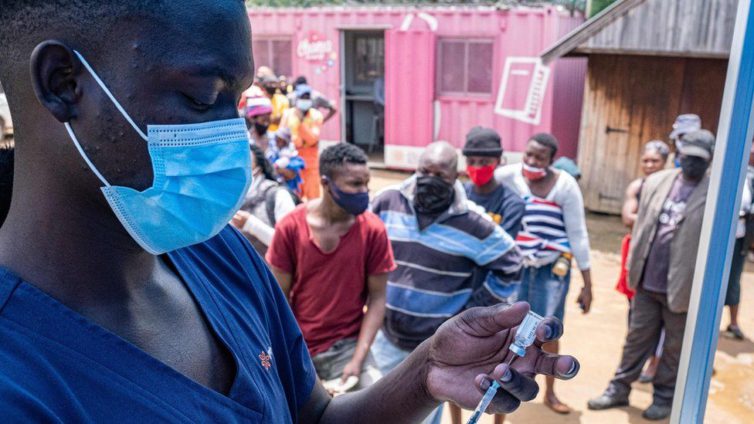The new coronavirus variant Omicron is spreading across the globe at an unprecedented rate, the World Health Organization (WHO) has warned.
Cases of the heavily mutated variant have been confirmed in 77 countries.
But at a press conference, WHO chief Tedros Adhanom Ghebreyesus said it was probably in many others that had yet to detect it.
Dr Tedros said he was concerned that not enough was being done to tackle the variant.
"Surely, we have learned by now that we underestimate this virus at our peril. Even if Omicron does cause less severe disease, the sheer number of cases could once again overwhelm unprepared health systems," he said.
The Omicron variant was first identified in South Africa in November, and the country has since seen a surge in infections. President Cyril Ramaphosa has tested positive for Covid-19 and is currently isolating with mild symptoms.
A number of countries have introduced travel bans affecting South Africa and its neighbours following the emergence of Omicron, but this has failed to stop it from spreading around the world.
In the press conference on Tuesday, Dr Tedros reiterated concerns about vaccine inequity, as some countries accelerate rollouts of a booster shot in response to Omicron.
Recent studies of the Pfizer/BioNTech vaccine showed it produced far fewer neutralising antibodies against Omicron than against the original strain, but that this deficit could be reversed by a third, booster, jab.
Dr Tedros said boosters "could play an important role" in curbing the spread of Covid-19, but that it was "a question of prioritisation".
"The order matters. Giving boosters to groups at low risk of severe disease or death simply endangers the lives of those at high risk who are still waiting for their primary doses because of supply constraints," he said.
Supplies to the global vaccine-sharing programme Covax have increased in recent months.
However, world health officials fear a shortfall of tens of millions of doses - like the one which occurred in the middle of this year when India suspended its vaccine exports - could happen again.
In poorer countries, some vulnerable people are yet to receive a single dose.
Latest Stories
-
E/R Minister assures GWCL of quality raw water clampdown on galamsey intensifies
3 minutes -
GPL 2024/25: Late comeback sees Accra Lions beat Basake Holy Stars
7 hours -
Wa-Bolgatanga Road Corridor to be completed under ‘Big Push’ initiative – Kwame Agbodza
9 hours -
De Bruyne scores as Man City thrash Palace
9 hours -
Thomas Partey scores for Arsenal in draw with Brentford
9 hours -
Don’t let your pens, cameras, microphones compete – Young African journalists urged to collaborate
9 hours -
Mahama launches Feed Ghana Programme to tackle food insecurity and reduce imports
10 hours -
Depoliticize Bawku conflict: Let Asantehene’s wisdom resolve crisis – Otumfuo Gold Coin Initiative pleads
12 hours -
8 illegal miners arrested in Eastern region, mining equipment seized
14 hours -
GES grants Easter Break for Form 2 students in transitional track schools
14 hours -
Trump exempts smartphones and computers from new tariffs
14 hours -
Suspicious flight saga: If this country would focus on ethics than law, we would move forward – Susan Adu-Amankwah
14 hours -
Ghana improves to 12th position in Africa with lowest fuel price
14 hours -
Works and Housing Minister to lead delegation to DPE 2025 in Canada
14 hours -
First commercial paper admission on GSE scheduled for April 17, 2025
14 hours

